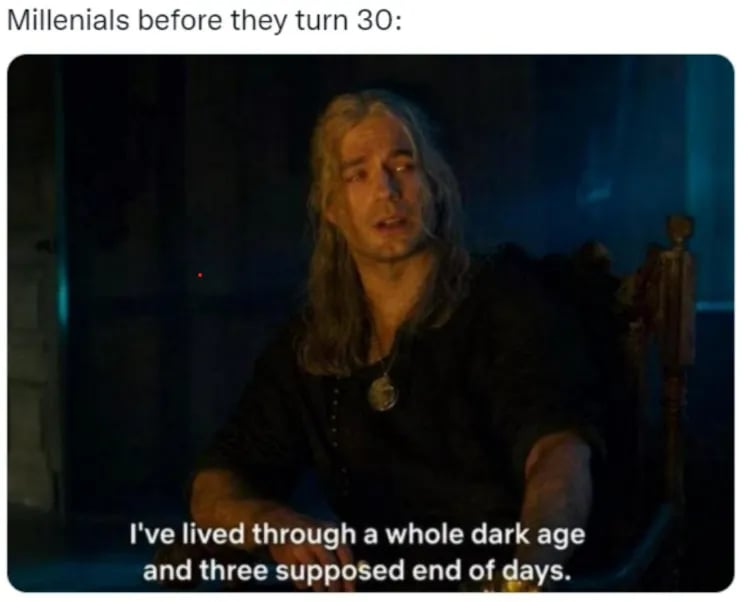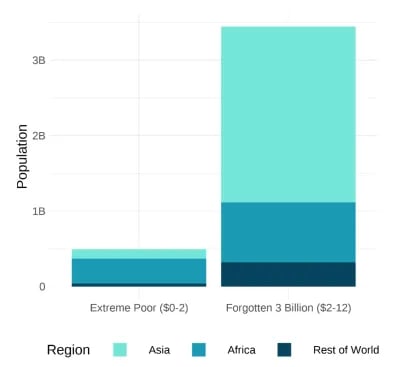The Dystopian Now
How I Learned to Stop Worrying and Love the Atonement
“The future is already here, it's just not evenly distributed.” William Gibson, The Economist, December 4, 2003
In the cold of the January 1991 thousands of brave people of Lithuania came out to defend their independence with their lives, standing unarmed against the tanks of the Soviet Empire. The Lithuanians won and it seemed that the 2nd Belle Epoque would begin the age of endless prosperity and peace. Just a year after the historic standoff, Francis Fukuyama published The End of History and the Last Man, where he unapologetically proclaimed the end of the evolution of our political, economic and social systems - the liberal democracy’s ascendance reached the apogee of human development and will usher in its bright and promising future.
I won’t get into debating Fukuyama here, it is not the point of the story and 30 some years later, the failings of this theory, beyond the ignoring the world outside of the Western discourse, are quite transparent anyway. The story is rather about the future, which is our present. Looking back, one can say that for a while, Fukuyama looked to have been right. The dissolution of Soviet Union, creation of European Union, the dot-com boom, expansion of NATO… if you were sitting in a think tank somewhere in the Western Hemisphere, it surely could have looked like the liberal democracy has won and it was only a matter of time before the future peace will arrive.
Then came 9/11, the Great Recession, Iraq, Afghanistan…
In the words of the late Ron Popeil1, “but wait, there’s more!”
Four years ago a doctor in Wuhan reported a mystery pneumonia, which origin was an unknown virus. Today, transmission of that virus is as high as it has ever been since that point. Millions of people a day. We are literally living through a perpetual pandemic while almost completely and quite conveniently ignoring its very existence.
A recent Gallup poll found that 77% of Americans believe crime rates are worsening, but they are mistaken, the new FBI data and other statistics show that violent crime dropped 8%, while property crime fell 6.3% to what would be its lowest level since 1961.
CNN poll from November of 2023 discovered that 84% of respondents were worried about the current state of economy, as opposed to 16% who were not. Similar poll from August of 2020 found the breakdown to be 58% who were worried and 41% who weren’t. That’s was in the middle of an unprecedented economic collapse in the midst of the pandemic.
However, it’s not just the false perception of economy’s current state. There’s an ongoing doomsday perspective of ever declining prospects of U.S. economic dominance to China, E.U., Narnia… Of course, the reality is, yet again, far different. That’s not to say that American economy has not decreased at the expense of competition, but close to half of the entire global market share is still based in the U.S.:
The triumph of doublethink is not that "we like being lied to, we like the promises that will never be kept" being a quote from an OpEd article on Javier Milei, Donald J. Trump or Narendra Modi, but rather a quote from J.G. Ballard, in 2006 (!!), on Tony Blair.
Ballard was, among many things, an underappreciated visionary who could see through the fabric of the Western cultural revolution in the 60s and clearly foresee the emerging patterns coming to fruition when in 1968 he wrote “Why I Want to Fuck Ronald Reagan” because he was impressed and inspired by the phenomenon of media politicians who speak for private interests, whilst pretending to speak for the public interest, because:
In his commercials Reagan used the smooth, teleprompter-perfect tones of the TV auto-salesman to project a political message that was absolutely the reverse of bland and reassuring. A complete discontinuity existed between Reagan’s manner and body language, on the one hand, and his scarily simplistic right-wing message on the other [hand]. Above all, it struck me that Reagan was the first politician to exploit the fact that his TV audience would not be listening too closely, if at all, to what he was saying, and indeed might well assume, from his manner and presentation, that he was saying the exact opposite of the words actually emerging from his mouth.[2]
If you immediately thought of Trump, Putin, Netanyahu and their ilk, think again. This is just as as true and just as applicable to Clinton (both of them), Obama, Starmer… and yes, I could easily go on, and on, and on. The only difference, really, is the skill and charisma between the two of these cohorts.
At this point, you are likely wondering to what degree will I continue to be hypocritical, starting with criticizing Fukuyama for being entirely too West-centered and then spending the entirety of the essay so far focusing only on the Western experiences and examples.
Anglophone literati are incapable of seeing the world otherwise than as a projection of our own internal discourse. Much of the Third World intelligentsia is forced to be bi or trilingual. It has no other choice. And when you daily switch between thee different languages and three discourses, you will register just how different they are. If, on the other hand, you can comfortably exist within one language (and discourse) without being forcefully immersed into others, you may start taking its tropes and conventions for the very fabric of reality. I’ve been quite guilty of this over the years, even though I am, myself bilingual, but I exist only within the realities of the Anglophone discourse, as I’ve purposely rejected Z-Nazism.
Thus, let’s take a “quick” look at how the 2nd Belle Epoque should really have been seen if one was not looking through the blinder of Anglophone discourse.
Unexpectedly, trickle down economics do work, but all sarcasm aside, the rest of the world has experienced a steady decrease in poverty to estimated 8.5 percent of the world’s population at the end of 2022, according to the World Bank. However, take this number with a very large grain of salt. Whilst most of countries, as well as as World Bank, set the national poverty line at 50% of a given year's median income. For instance, the median income in the United States was $74,580 in 2022 so the national poverty line would be $37,290. However, some countries use different calculations. The U.S., for example, uses a formula first devised in the 1960s, which calculated the estimated cost of adequate food for a year and multiplies by three to account for additional costs (housing, utilities, medical expenses, etc.). For 2022, this formula set the poverty threshold at $27,750 for a family of four.
Of course, it gets worse. According to the Brookings “there are 3.4 billion people who are seemingly forgotten, not extremely poor, not part of the middle class, and not rich. Who are they?
The missing group is perhaps best described as the “vulnerable.” They are not poor enough to feature prominently in the poverty and inequality discourse, yet they have been seriously affected by the recessions caused by COVID-19, and by food and fuel shortages and price increases.”
Poverty and economic vulnerability rarely are lonely visitors. While we, in the West, largely focus on conflicts that directly impact us and therefore are mentioned in the news and social media, too often we lack knowledge of the degree to which the violence has steadily engulfed the globe.
Over two billion people, or a quarter of the world's population, now lives in conflict-affected areas, according to the United Nations. I can hear your eyes rolling at the mention of UN’s data, but honestly, the map and the number seems to be on an extremely conservative end.
As it is often happens during armed conflicts, millions have been displaced - at times, escaping the dangers of war, and at times being forcefully removed as part of ethnic cleansing or genocide. This is a very sensitive topic at the moment, alas, since that fateful January of 1991 at least 14,000,000 have been displaced or imprisoned due to ethnic cleansing campaigns, and at least 3,000,000 dead genocide2.
To wrap it up with a nice little bow, the liberal democracy, that supposedly has achieved the triumph of human civilization some 30 years ago is in a dire global threat. The winds of authoritarianism are blowing stronger, eroding established safeguards of not just democracy but liberty around the globe. Authoritarians have nearly perfected their tactics, deftly subverting institutions once meant to protect freedoms. Their influence, oftentimes by proactive efforts, spills beyond borders, emboldening and encouraging others. Within established democracies, internal fissures are exploited, twisting political discourse into a weapon of hate and division. Caught in the precarious space between liberty and autocracy, fragile democracies teeter closer to the abyss. By one estimate 72 percent of the world's population, 5.7 billion people, live under authoritarian rule”, according to Staffan I. Lindberg, Director of the V-Dem Institute.
By now, I am sure you are wondering, what is the point of this essay and whether there even is one. The point of this galloping through the horrors of today is that I started to think about the framing of our current discourse the day that Shohei Ohtani signed the largest contract in professional sports history - 10 years, $700,000,000 - which included an unprecedented deferral of $68,000,000 per year to be paid after the actual contract expires3. One of the first reactions that I saw from another player was from Brent Rooker, a journeyman reliever:
I can’t speak to how many post-apocalyptic movies and shows Brent watched, but I can safely say, and this is by no means is meant as a boast, I’ve watched and read more dystopian and post-apocalyptic fiction that is healthy for a dozen of human beings. Even my thesis was on 20th century eschatological literature and literary theory… and this colloquy is really meant to help set the perspective that our present, not our future, is fully dystopian.
“Sick cultures show a complex of symptoms such as you have named...but a dying culture invariably exhibits personal rudeness. Bad manners. Lack of consideration for others in minor matters. A loss of politeness, of gentle manners, is more significant than is a riot.”
― Robert A Heinlein, Friday
Heinlein is another prophetic writer from the 1960s and in part of The Dystopian Now, we’ll explore just how deep we really are into this rabbit hole…
I wanted
the past to go away, I wanted
to leave it, like another country; I wanted
my life to close, and open
like a hinge, like a wing, like the part of the song
where it falls
down over the rocks: an explosion, a discovery;
I wanted
to hurry into the work of my life; I wanted to know,
whoever I was, I wasalive
for a little while.
If you thought of Billie May when reading “but wait, there’s more” you are not alone. When writing this piece, I could not think of his name and decided to google it, and was surprised to find out that in fact it was Ron Popeil and it was not the only famous phrase he coined.
This number does not include casualties in the Ukraine and Gaza, though they should.
Quick explanation for those who are not sports or baseball fans - the deferrals, brings the current day value of the contract to $460,000,000, lowering LA Dodgers’ total salaries for CBT purposes and enabling Ohtani, who presumable will move back to Japan at the end of the contract, to escape most of that tax on his $68,000,000 for the next ten years.








